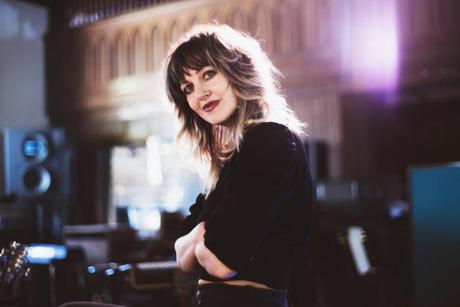
Musicals are a notorious way to suck up long stretches of your life. They've taken a long time to develop, but Hadestown - the biggest musical to premiere in the West End so far this year, loosely based on the Greek myth of Orpheus and Eurydice - has really been a long and winding road. Its creator, Anaïs Mitchell, has been working on it, in one form or another, for twenty years.
It doesn't seem to have taken its toll. "The crazy thing about living with this show is that it has kept on giving," the musician turned musical theater writer says when we meet, sounding remarkably clear for someone who has stepped off a transatlantic flight a few hours earlier.
Looking back on the long and winding road from Hadestown to the West End - which started with one song when she was a gigging folk musician and included a stint at the National Theater before she picked up a string of Tony awards for her performance on Broadway - Says Mitchell: "I think it took so long because I didn't know what I was doing or what I was getting into. I don't come from the theater world, I come from the singer-songwriter world. I love folk music and ballads, but I was always interested in telling stories through songs." In one of the show's standout songs, Why We Build the Wall, Hades, king of the underworld, sings that "our work is never done". It seems the same is true for Mitchell: she flew in for 48 hours to do some to make edits in the London production. The show has been through years of development and multiple versions; will it ever be finished?
"It's a folk song in that respect, and it just keeps evolving, and that's OK," Mitchell says. Could she still be working on it in ten years? She laughs: 'I hope not.' In fact, she left it behind after it opened on Broadway. "I really moved on for a few years and was just happily back in the sandbox of the music world. It was really just London's opportunity, it felt like a rebirth."
Hadestown is a sing-along musical that follows the tragic story of the idealistic young lovers, but also that of Hades and his wife Persephone.
The story continues
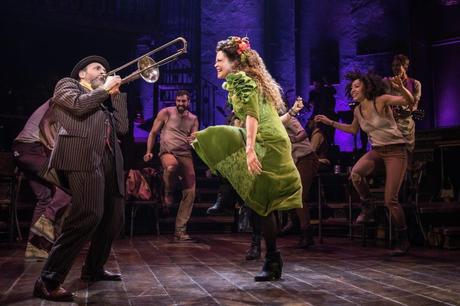
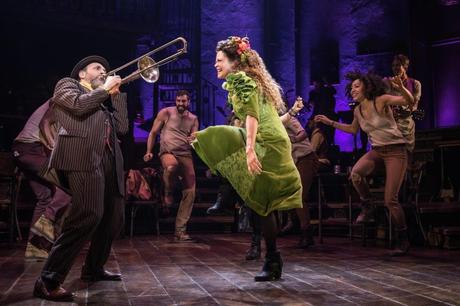
While not tied to a specific time or place, the style is inspired by the Great Depression era and specifically New Orleans at the time. The music and decor pay tribute to the city's legendary music scene and, in particular, the Preservation Hall jazz club. From the railroad rhythms of Way Down Hadestown to the folk lament We Raise Our Cups - this includes Southern soul, ballads, rock and jazz. Hot, sultry and sexy... Les Mis is not.
And it all started late one night, about twenty years ago, between performances and the chorus of a song about Orpheus "who just fell from the sky into my lap." Fast forward to today and that song, Wait for Me, is still a cornerstone of the show.
"There's always a combination with any creative work of grace and effort, where something falls out of the sky - and you end up chasing it for ten years," says Mitchell.
Musicians love the story of Orpheus - who played the lyre so skillfully that he could charm Hades himself - but as an idealistic twenty-something, his story "seemed to encapsulate a lot of what I was feeling at the time. I'm in my forties now and I can identify with the older characters."
Mitchell had a string of critically acclaimed solo albums, including The Brightness and Young Man in America, but her solo career was put on the back burner as the musical gained momentum. She says, "I worked on Hadestown for so long that I was afraid I would never make another record."
What started as one song became the basis for what Mitchell describes as a "DIY community theater" show in her home state of Vermont. She recorded a Hadestown concept album in 2010, which became a concert tour, and then a full-fledged Off-Broadway production that traveled to Edmonton, Canada, and to the National in 2018, where The Guardian praised her "cracking songs." .
Mitchell loved her time on the South Bank and called the NT 'one of the wonders of the world. What a beautiful institution." The following year, Hadestown opened on Broadway and went on to win eight Tony Awards, including Best Musical.
A key part of making the show work was bringing theater director Rachel Chavkin on board more than a decade ago. "Rachel is very tough," says Mitchell. "She challenged me a lot... but we stuck together, we stayed in the trenches together and we didn't give up on each other."
Above her desk, Mitchell has a photo of her with Chavkin at Off-Broadway previews, and they are holding each other's faces at the temples. "We do this because we're trying to have a meaningful conversation in a room full of people, and it seems like we're hugging each other and also wrestling. That's kind of what it's like to work with her."
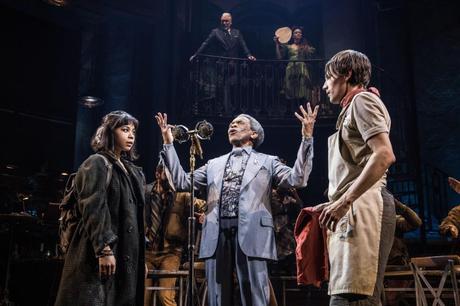
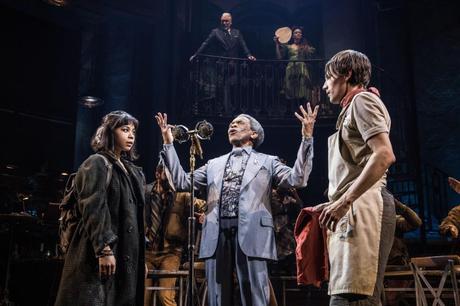
At the time of its national run, Variety called it a "good times show for bad times, a hoot that hits its political points hard." These points include climate change, late-stage capitalism, and the politics of fear and division.
Why We Build the Wall, written in 2006, was an example of how Mitchell's songs seemed remarkably prescient. She wrote it ten years before Donald Trump was elected US president, using the rhetoric of building a wall in his campaign. "I think Trump tapped into the mythology," she says. "He used it because it is an image that works well for people who feel insecure."
The longer she lives with the show, the more she sees in it how young people see the world now. "They say, 'What the hell?' Like in the United States they see that there is no gun control and that children are being murdered in school. Or that there is climate change and they say, 'This has to change.' It's so clear to them. It's just so hard to maintain that vision as you get older."
She adds: "But ideally a new harvest will arrive, just like spring. There is a new group of young people with a new vision. Maybe they can solve it for us."
She thinks a lot about the big problems and the future, but does not write open protest songs; she prefers to look at themes through stories. "I don't want to be restrictive about it. I think art in general doesn't often have the answers, but ideally it asks the questions, not just of the mind, but of the heart and lived and shared experience. Putting yourself in someone else's shoes and having feelings about that is a political act."
If Hadestown has a moral, she says, it is: "you have to try, you have to have hope, not because success is a given - it isn't. Orpheus fails. We heroize" - here she breaks off to apologize for the fact that jet lag has caused her to make up words - "we heroize Orpheus not because he succeeds, but because he tries, and that undertaking alone is worth the effort worth. To live, and not just to survive, is to believe that things can change."
Hadestown's popularity may also be due to the way the British love a heroic failure, I add.
When she started work on Hadestown, Mitchell never in her wildest dreams thought the show would make it to Broadway. So she fondly remembers one of the last days in Manhattan leading up to the grand opening - still adjusting the show, of course - and she couldn't sleep, so she went for an early morning jog.
"I saw these kids camping outside the theater dressed as the characters from the show. I thought, 'I have no idea what this show means to these kids. It's not mine, it lives in the world and it's its own animal. "


Mitchell lives in Vermont in a house on the family farm where her grandparents once lived. Her parents have a house there, as does her brother. She moved from New York a week before the lockdown and returned with her husband and first child when she was nine months pregnant.
By the way, it turns out that she met her husband when she was a life model in art class, during a workshop in college. She laughs when I bring it up. "My parents were hippies and I was always comfortable with nudity. It was great money, and I kept doing it in college. And he was in this workshop and I noticed him from the model booth, and he took off his shirt out the way he was and I thought, 'Who was that guy?' The rest is history."
She grew up with nature - and culture - all around her. Her parents were real hippies, who bought the farm from the proceeds of a screenplay (and named it after writer Anaïs Nin). Mitchell always loved songs and growing up, "there was a lot of folk music associated with that hippie community of the 1960s and 1970s." At fifteen she picked up the guitar and started writing.
"It was a powerful time for female singer-songwriters," she says. "It was the nineties. My idols were Ani DiFranco, Dar Williams, Tori Amos... I heard that music and thought: 'I want that.' It was stripped-down, emotional and text-oriented storytelling."
As she delved into the world of folk, she discovered more traditional music, going back further and discovering ballads from the British Isles, which inspired her. "What I loved, and still love, is the idea of a song that could have lived 100 years ago and 100 years from now."
Mitchell went on to work with idols, including DiFranco, who signed Mitchell to her label and subsequently sang on the original Hadestown concept album, as did Bon Iver's Justin Vernon. "The real full-circle moment is that Ani will be playing the role of Persephone on Broadway starting in early February. That just amazes me. As a young girl who idolized Ani DiFranco and ended up landing her record label, and the way she helped get this show off the ground. And at this point in her life she is ready to make such a leap - she has never been in the theater business before."
Currently, her greatest joy is getting back into music. Last year she released a self-titled solo album and wrote and recorded with her band Bonny Light Horseman. She is trying to write a new piece, but is tight-lipped about the details.
"I wrote a bad draft and now I have to try to write a good draft," she says. "Knowing what I know now, ideally it won't take that long this time."
Hadestown opens February 10 at the Lyric Theater and books until August 4. Book tickets here